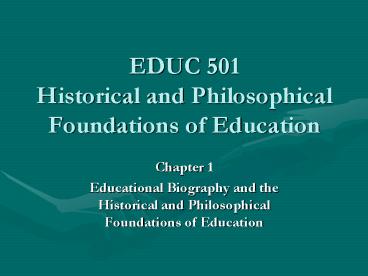EDUC 501 Historical and Philosophical Foundations of Education - PowerPoint PPT Presentation
1 / 22
Title:
EDUC 501 Historical and Philosophical Foundations of Education
Description:
EDUC 501 Historical and Philosophical Foundations of Education Chapter 1 Educational Biography and the Historical and Philosophical Foundations of Education – PowerPoint PPT presentation
Number of Views:2491
Avg rating:3.0/5.0
Title: EDUC 501 Historical and Philosophical Foundations of Education
1
EDUC 501Historical and Philosophical Foundations
of Education
- Chapter 1
- Educational Biography and the Historical and
Philosophical Foundations of Education
2
Overview of Chapters 2-24
- Historical narrative
- Context
- Times and situation
- Biography
- Analysis of the educational ideas and practices
as to their contemporary meaning and significance
3
Ancient China, Greece and Rome
- Confucius (551-479 B.C.) Proponent of
Educating for a Harmonious Society (Chapter 2) - Plato (427-347 B.C.) founder of Idealism
(Chapter 3) - Aristotle (384-322 B.C.) founder of Realism
(Chapter 4) - Quintilian (A.D. 35-95) - exemplary teacher of
rhetoric (Chapter 5)
4
Medieval Christianity
- Thomas Aquinas (1255 1274) Theologian and
philosopher of the Middle Ages (Chapter 6)
5
Renaissance
- Desiderius Erasmus (1466-1536) Humanist the
ideal representative of Renaissance humanism
(Chapter 7)
6
Protestant Reformation
- John Calvin (1509 1564) - Theologian and
Educator (Chapter 8) - Johann Amos Comenius (1592 1670) Pan sophist
Educator and Proponent of International Education
(Chapter 9) - Represented two different ways of interpreting
the educational changes produced by the
Protestant Reformation.
7
Enlightenment
- Jean-Jacques Rousseau (1712 1778) Prophet of
Naturalism (Chapter 10)
8
post-Enlightenment
- Johann Heinrich Pestalozzi (1747 1827) Swiss
educational innovator and Proponent of Educating
the Heart and the Senses (Chapter 11)
9
Age of Revolution and Republicanism
- Thomas Jefferson (1743 -1826) American
Statesman, 3rd President of the United States,
and Advocate of Republican Education (Chapter 12) - Mary Wollstonecraft (1759 1797) Proponent of
Womens Rights and Education, Feminism (Chapter
13) - Horace Mann (1796 1859) Leader of the Common
School Movement (Chapter 14)
10
Responses to the Industrial and Darwinian
Revolutions
- Robert Owen (1771 1858) Utopian Socialist and
Communitarian Educator (Chapter 15) - John Stewart Mill (1806 1873) Proponent of
Liberalism (Chapter 17) - Herbert Spencer ( 1820 -1903) Advocate of
Individualism, Science, and Social Darwinism
(Chapter 18)
11
Progressivism (Early 20th Century)
- Jane Adams (1860 1935) Advocate of Socialized
Education, Founder of Hull House (Chapter 19) - John Dewey (1859 1952) Americas Leading
Pragmatist Philosopher and Progressive Educator
(Chapter 20) - William Bagley(1874-1946) Stalwart
Traditionalist Educator (Chapter 21)
12
Early Childhood Education
- Friedrich Froebel (1782 1852) German Educator,
Founder of the Kindergarten (Chapter 16) - Maria Montessori (1870 1952) Proponent of Early
Childhood Education (Chapter 22)
13
Attack on Colonialism
- Mohandas Ghandi (1869 1948) Won Indias
Independence by nonviolent resistance (Chapter 23)
14
pan-Africanism
- W. E. B. Du Bois (1868 1963) - Scholar and
Activist for African American Rights (Chapter 24)
15
Neo-Marxism, existentialism, postmodernism, and
critical theory
- Mao Tse-Tung (1893 1976) Revolutionary
Educator, Founding Father of the Peoples
Republic of China, Leader of the Communist
revolution (previous Chapter 24) - Paulo Freire (1921 1997) Advocate of Liberation
Pedagogy (current Chapter 25)
16
Organization of Chapters
- Historical Context - places the educational
thinker in the historical, cultural and
philosophical situation of her or his time - Biography - analyzes the formative persons and
events that shaped his/her educational philosophy
or ideology - Analysis of the Educational Thinkers Philosophy
or Ideology identifies the theorists principal
ideas about truth and value, education and
schooling, and teaching and learning.
17
Organization of Chapters (contd)
- Conclusion assesses the educational
contributions and significance of the theorist - Discussion Questions relate the educational
thinker to both her or his time in history and to
the present situation in education - Research and Essay Topics lead to analysis of
trends and issues in the history, philosophy, and
ideology of education - Suggestions for Further Reading
18
Dates for presentations EDUC 501
- Harrogate Class
- September 7th
- Tenets - Groups
- September 21st
- Chapters 2-6
- September 28th
- Chapters 7 - 12
- October 5th
- Chapters 13 - 17
- October 12th
- Chapters 18 22
- October 19th
- Chapters 23 -25
19
Presentation Format
- PowerPoint or Prezi presentation
- Copies of slides for each person (Harrogate-12)
These may need to be used in case of equipment
failure. - Activity, timelines, interviews, hotlinks, period
dress, role playing, maps, quotations, United
Streaming or YouTube clips, original work
(include if appropriate) - Films can be shown for some chapters
- Make your person come alive and be interesting
- 20 minutes in length
20
Presentation Format (contd)
- Last slide should be bibliography slide
- Each slide should have citation and a slide
number - Proofread your presentation and make certain of
backgrounds, font sizes, music or video clips,
and then e-mail (or submit it to LiveText) your
presentation to me as an attachment 2 days prior
to the date you are to present so I can preview
it and discuss any needed changes and have it on
my laptop. - You should also bring a copy of it on a CD or
flashdrive
21
Personal Philosophy Presentations
- Harrogate (Dates to Be Determined)
22
(No Transcript)

